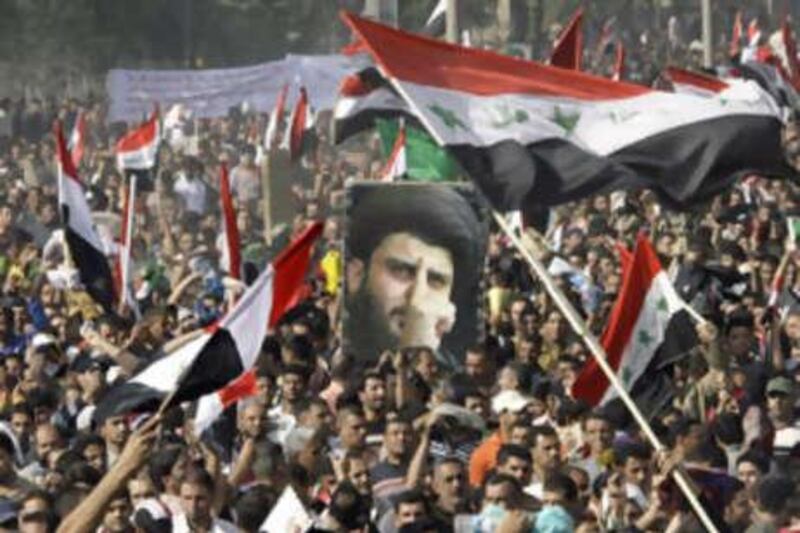Thousands of Shiite followers of the firebrand anti-American cleric Moqtada al Sadr gathered in Baghdad today to protest a security accord that would allow US troops to remain in Iraq until 2011. The crowds swarmed into central Baghdad's Firdoos Square, where a large statue of executed dictator Saddam Hussein was torn down by US troops a few weeks after the March 2003 invasion that toppled him. The protesters hung an effigy of US President George W Bush carrying a suitcase labelled "security agreement" from the abstract statue that now stands in the centre of the square.
A sign pinned to the effigy reflected the mood of the protesters, "The security agreement is shameful and humiliating." The agreement, which was approved by the Iraqi cabinet on Sunday after nearly a year of hard-nosed negotiations, would govern the status of some 150,000 US troops when their UN mandate expires at the end of the year. It would require all foreign forces to withdraw from Iraqi cities and towns by the end of June 2009 and to withdraw completely from Iraq by the end of 2011.
It has drawn fire from Mr Sadr's followers, who are against signing any agreement that would legitimise the US "occupation". "No, no, to the agreement!" the crowds chanted beneath a huge banner with a picture of bloody, cuffed hands reaching out from a map of Iraq and three keys labelled with American, Israeli, and British flags. Other banners in English read "No for the security agreement that makes Iraq a prisoner and without sovereignty" and "Occupied forces must leave Iraq now".
Huge portraits of the young, black-turbaned Mr Sadr glared down at the crowd from buildings lining Saadun street, a main thoroughfare leading to the square, as Iraqi army soldiers took up positions on rooftops and patrolled the edges of the protest. "We are following the call of Muqtada al Sadr to pray and demonstrate against the accord and against the occupation," said Nawfal Faraj, 36, a civil servant.
"This agreement is not clear. It allows the occupation forces to stay in Iraq." Sheikh Talal al-Saadi, the imam of Baghdad's revered Kadhimiyah shrine and one of several clerics in the crowd, said he had heeded Mr Sadr's call to demonstrate against the "humiliating" agreement. "The agreement allows the occupiers to stay three years in Iraq, while (president-elect Barack) Obama wants to withdraw them within 16 months. We want the Iraqi government to be patient and to wait for Obama's order," he said.
Another imam, the Sadrist sheikh Abelhadi al Mohammedawi, then led the thousands of protesters, virtually all of them men, in Friday prayers before reading a statement from Mr Sadr, who is believed to be in Iran. "If they don't leave the country I am going to be with you to make them leave in a way that suits you, as long as it doesn't go against the religion. And if they leave I will be with you to protect the Iraqi people," Mr Sadr said in the statement.
The Sadrists had called on both Sunnis and Shiites to attend the demonstration and the Sunni imam Quteiba al-Nadawi led the crowd in chants of "Yes, yes to unity... Yes, yes to Iraq... No to submission, No to this agreement!" The pact has been loudly debated on the floor of the Iraqi parliament in recent days, where the 30-member Sadrist bloc has sought to derail it with legislative manoeuvres, shouting and desk-pounding.
But the agreement ? which enjoys the support of the assembly's large Shiite and Kurdish blocs ? appeared likely to win a simple majority in the 275-member body, which is expected to vote on the agreement next week. * AFP





